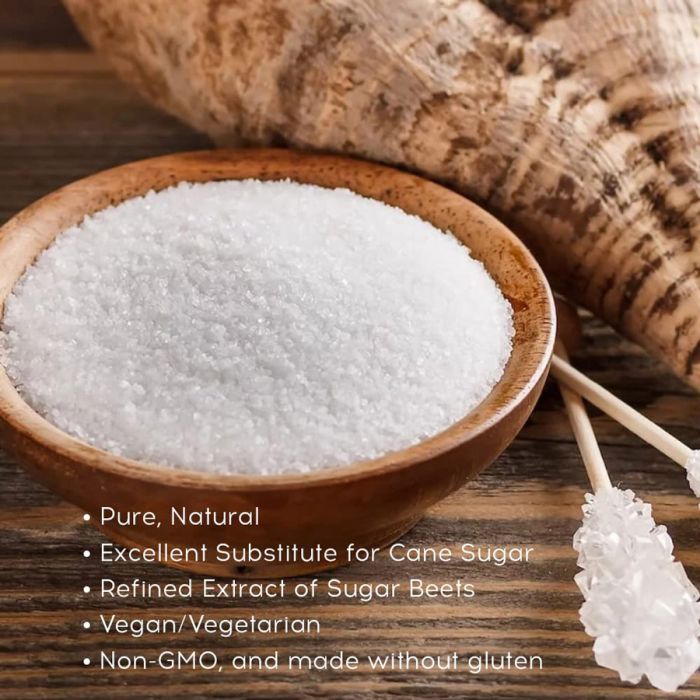A key factor in the beet sugar vs cane sugar debate is how each kind impacts baking.
Checking Out the Distinctions being used and Advantages Between Beet Sugar Vs Cane Sugar
In the culinary world, the selection between beet sugar and cane sugar is not simply regarding sweet taste but includes a nuanced consideration of taste, application, and effect. While both sugars stem from different plants, each undertakes distinct production procedures that discreetly influence their features and suitability for different recipes.
Origins and Production Processes of Beet and Cane Sugar

Cane sugar, on the other hand, comes from the sugarcane plant, an exotic lawn belonging to Southeast Asia today grown in tropical areas worldwide. The manufacturing of cane sugar begins with the harvesting of cane stalks, which are squashed to release the juice. This juice is after that boiled to concentrate it, after which it is rotated in centrifuges to produce raw sugar crystals. These crystals are more improved to create the white sugar commonly readily available in stores.

Nutritional Material and Health Considerations

When contrasting the nutritional content of beet sugar and cane sugar, it comes to be apparent that both kinds basically offer the very same calorie worths, with about 16 calories per tsp and no considerable nutrient variety. Each is composed almost totally of sucrose, which is a simple carbohydrate that offers fast power yet lacks vitamins, minerals, or fiber. This resemblance includes their influence on health and wellness, specifically worrying blood sugar levels. Both sugars, when consumed over, can add to raised blood sugar levels, a danger factor for diabetic issues and various other metabolic problems. Furthermore, extreme consumption can cause weight gain and oral troubles, as both sugars are just as cariogenic, promoting dental caries. From a health and wellness point of view, moderating consumption of any kind of kind of sugar, whether from beet or cane, is suggested to stay clear of these possible unfavorable results on wellness. Thus, neither holds an unique advantage over the other in terms of wellness advantages.
Taste Profiles and Culinary Applications
Despite their similar chemical frameworks, beet sugar and cane sugar vary subtly in taste, which can affect their usage in different cooking contexts. Walking cane sugar frequently carries a tip of molasses, also in its refined form, offering a cozy, caramel-like undertone that improves baked products, coffee, and chocolate-based recipes. This see slight molasses flavor is specifically valued in the cooking sector for including deepness to sugary foods and pastries. On the other hand, beet sugar is identified by its very refined, neutral preference, making it a versatile sweetener that does not alter the flavor profiles of dishes. This nonpartisanship is especially helpful in fragile recipes, such as light breads, lotions, and some sauces, where the intrinsic flavors of various other components are intended to attract attention. Cooks and food manufacturers may choose one type of sugar over the other based on the wanted taste outcome of their cooking developments.
Ecological Influence and Sustainability
While both beet and cane sugars are obtained from plants, their environmental impacts vary dramatically due to the distinctive techniques of cultivation and processing required for each. Sugar beet farming commonly look at this now includes substantial mechanization, which can raise fossil gas intake and carbon discharges.
Additionally, the processing of sugarcane frequently produces a substantial quantity of waste, including bagasse, which, although usable as biofuel, frequently adds to air contamination if burned inefficiently. Sugar beet handling makes use of even more of the raw products, leading to much less waste. Both sectors deal with challenges in lowering their environmental impacts, yet continuous developments in agricultural methods and waste administration are aiming to boost sustainability.
Economic Variables Affecting the Sugar Industry
The economic dynamics of the sugar industry are dramatically influenced by international market demands and profession policies. In areas where sugarcane or sugar beet production is subsidized, manufacturers might have a financial benefit that allows them to supply lower costs on the worldwide market.
Additionally, changes in international demand for sugar, affected by dietary patterns and commercial use in food, straight effect rates and production degrees. beet sugar vs cane sugar. Weather condition conditions also play a see post crucial function, as they can dramatically affect plant yields and, as a result, the supply chain. This irregularity presents a level of economic unpredictability that can lead to investment volatility in sugar manufacturing fields, influencing choices from planting to market approach
Conclusion
In conclusion, both beet and cane sugar have unique top qualities that fit different cooking requirements. While cane sugar imparts an abundant flavor perfect for improving baked items, beet sugar's nonpartisanship is perfect for lighter recipes.